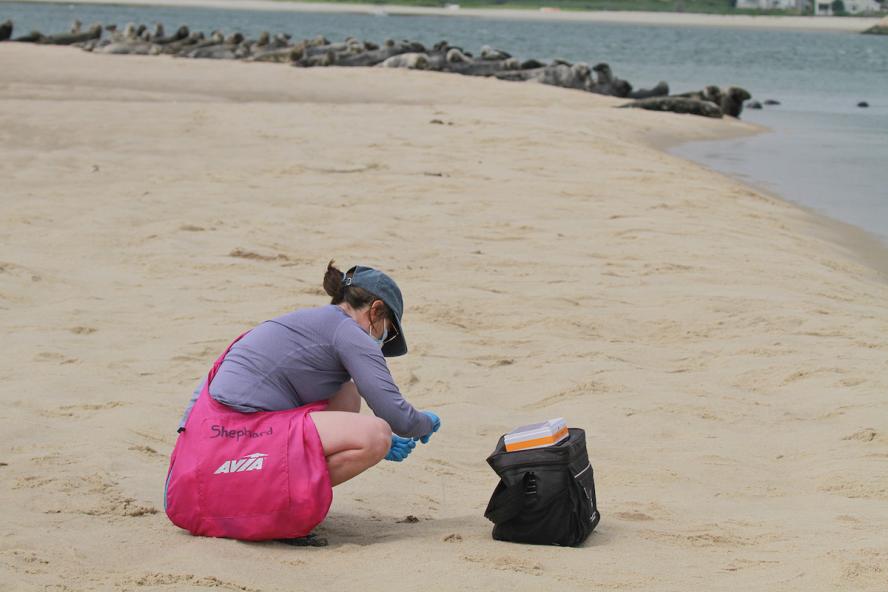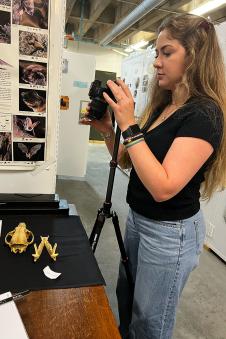-
About
- Leadership & Faculty
- News & Events
-
Academics
- Graduate
- Advanced Clinical Training
- Continuing Education
-
Student Life
-
Research
-
Hospitals & Clinics
- Emergency Care
- Hospital Services
-
Community Outreach
- Volunteer
Ready to Launch
Externships through Cummings School’s Master of Science in Conservation Medicine program help prepare individuals to address urgent environmental issues

The sheer diversity of their work is striking. Graduates of the Master of Science in Conservation Medicine (MCM) program at Cummings School of Veterinary Medicine assume myriad roles to tackle urgent environmental issues across the globe through a One Health approach.
For example, Stephanie Brinez, VG21, is conserving urban bat populations in Miami, a position she landed as a result of an externship. Epidemiologist Madison Evans, VG20, assisted residents through the COVID-19 pandemic with the Delaware Division of Public Health. And Paula Castaño, VG12, helps to restore ecosystems on the Galapagos Islands.
In addition to completing a year-long, self-directed Case Study Project through Cummings School, where skills are applied on a topic of interest, students also complete an immersive externship at a location of their choice, helping to gain experience, make connections, and possibly chart a course for their future. Sometimes the externship leads directly to a full-time position, but regardless, the experience always provides what students need to further their careers.
Since the graduation of its first class in 2012, all of the MCM program’s 188 graduates have completed an externship in their chosen area of study, across hundreds of different programs, organizations, and institutions at locations throughout the United States and on five continents.
“Prospective students consistently ask about externship opportunities,” says Chris Whittier, V97 (he/his), MCM program director and assistant teaching professor in the Department of Infectious Disease & Global Health.
The externships provide an experiential learning opportunity and students are required to complete an equivalent of four weeks in a setting that best fits their interests and aspirations. While the MCM program has relationships with organizations that have served as externship sites for students in the past, those placements are atypical.
“We want students to determine what they are interested in, and find an opportunity that suits those needs,” says Whittier.
“There are a wide variety of externship placements, from visiting a location to work with somebody, to working remotely on a data set and writing a paper for publication or conducting research in a local lab. Most tend to go to non-governmental organizations or benchtop labs, a handful travel abroad, or apply and fill an advertised intern position.” Cummings School also has local opportunities available for students to fulfill this requirement, if needed.
A brief winter term between Christmas and the restart of classes in January allows time for students to complete an externship, if desired. Overall, many students secure a placement that is much longer, according to Whittier, usually completing it over the summer and sometimes in a paid position like an entry-level job, while others have served in a position for up to nine months.
Members of the Class of 2023 completed placements with organizations including Wildtracks and the Belize Foundation for Research & Environmental Education in Belize, Ireland’s Seal Rescue Centre, Jamaica’s Oracabessa Bay Sea Turtle Project, and the Centre of Compassionate Conservation in Australia.
Domestic externships included California’s National Marine Mammal Foundation and U.S. Geological Survey, Florida Fish and Wildlife Conservation Commission, North Carolina Natural History Museum, as well as Boston Nature Center, New England Aquarium, and International Fund for Animal Welfare in Massachusetts.
One recent graduate, Susana Gonzalez, V22 (she/her), started a research project as a Cummings School MCM student in Juneau, Alaska, and has continued her research as a Ph.D. candidate in coastal and marine system science at Texas A&M University.
“Tackling world problems with an understanding that the health of animals, humans, and the environment are all connected intrigued me,” says Gonzalez. “I knew I would be challenged by the advanced format of the program, which would help me grow professionally.”
Through attentive support and mentorship, each student finds the personalized externship opportunity to highlight their Cummings School education.
Connecting students with a placement that caters to their interests and aspirations is my favorite part of my job,” Whittier shares.
“It provides them with new insights and skills, helps to confirm or deny a possible career path, and often opens doors to future opportunities.”
Working Toward Impacting the Environment
Cummings School’s M.S. in conservation medicine uses a One Health approach to educate and train students how to make an impact on the environment and ecosystem.
